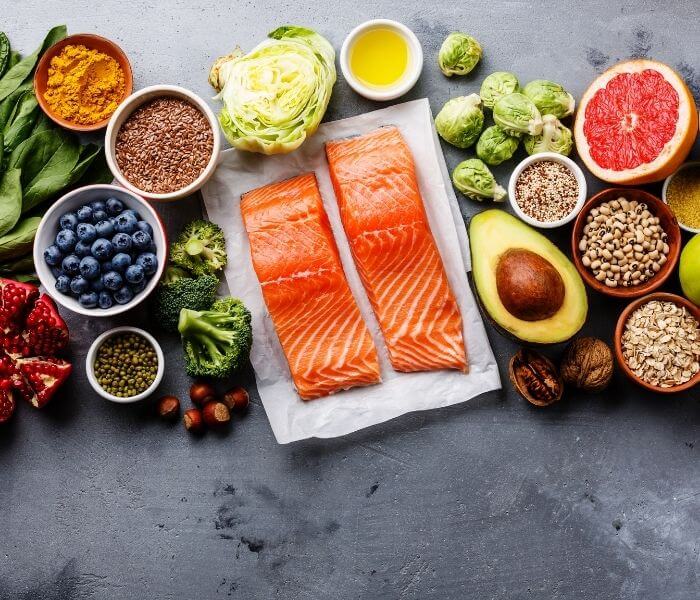Diet and nutrition can support an active, healthy lifestyle and maximize well-being. Be wary of common nutrition mistakes that may sabotaging your progress such as skipping meals, overeating calories, adhering to fad diets or neglecting hydration needs.
Eat foods from each major food group at each meal to achieve balance; ensure every meal includes protein, whole grains, dairy products, fruits and vegetables as well as healthy fats such as avocado and seeds for fat intake as well as taking necessary vitamins and minerals supplements.
Protein
Protein is an essential macronutrient for building strong muscles, supporting immunity, and increasing energy levels. With this book you’ll discover how to best balance your protein consumption for overall wellness.
Eating healthily is the cornerstone of good health and fitness, with nutrition advice from America’s foremost alternative health expert The Ultimate Guide to Nutrition and Diet for Wellness providing everything you need to start the path to better bodies. This comprehensive reference and sourcebook is the key to reaching optimal wellness – discover how you can maximize every moment in life every day with this invaluable resource!
Carbohydrates
Carbs are essential macronutrients that supply glucose to fuel body functions and physical activity. Consuming enough carbs is integral to maintaining a healthy weight and diet; having an adequate supply from whole foods (starches, vegetables, fruits and beans) is also vital for brain health, digestive well-being and heart wellness.
All digestible carbohydrates are broken down by our bodies into glucose for immediate energy use or stored as glycogen for later. Carbs vary in their glycemic impact depending on how quickly and easily they’re absorbed and processed by our bodies; furthermore they’re classified either simple or complex depending on their sugar molecules’ length; short chain monosaccharides like sucrose (table sugar), lactose (the milk sugar), fructose and fructose are considered simple while long chain polysaccharides found in whole grains vegetables legumes fall under complex classification.
Carbohydrates should make up between 45-66% of daily caloric intake to provide enough energy for proper body functioning and a healthy lifestyle. Focusing on overall dietary patterns of carbohydrates rather than specific food sources will have more positive health outcomes for most. It is wise to prioritize whole foods over added sugars when selecting carbohydrates for inclusion in daily meals.
Fats
While fats have earned themselves an unfavorable reputation, certain kinds of healthy fats can actually play a pivotal role in supporting health goals. Fats found in avocados, olive oil, seeds and fish contain monounsaturated and polyunsaturated acids which have numerous health benefits such as helping regulate cholesterol and inflammation while supporting brain health and vitamin absorption.
Fats are a concentrated energy source, providing 9 calories per gram–more than either carbohydrates or proteins–to power our daily activities. Unfortunately, many individuals don’t consume adequate quantities of healthy fats that may positively influence health outcomes.
The body needs an abundance of essential nutrients in order to function efficiently, such as carbohydrates, proteins, fats and vitamins and minerals. Macronutrients such as proteins and fats are needed in greater amounts, while micronutrients like vitamins and minerals play an essential role in supporting bodily processes. Adopting healthy eating habits is key for maintaining balance and improving overall wellness. By following the advice and strategies in this ultimate guide to balanced nutrition, you can incorporate healthier foods into your diet and start experiencing positive changes in both health and well-being. Furthermore, this resource and inspiration provide will allow you to maintain these healthier habits long term.
Vitamins & Minerals
Vitamins and minerals, or micronutrients, play an integral part in maintaining bodily functions. For maximum effectiveness, it’s ideal to obtain these micronutrients through eating a varied and well-balanced diet as opposed to supplements; however, supplementation may be useful if dietary restrictions or deficiencies exist, or for health care professional consultation before starting supplementation regimens as excessive dosages of certain vitamins could prove harmful.
Vitamins are organic compounds that play an integral part in various biological processes, from energy production and digestion to providing muscle fuel during exercise. B vitamins, iron and magnesium are some of the key vitamins for fitness.
Minerals are inorganic substances that support many bodily processes, from maintaining fluid balance and muscle contractions to supporting bone health and acting as co-factors in enzymatic reactions. Some of the key minerals for fitness include calcium, magnesium and zinc.
Vitamin and mineral supplements can be essential when trying to meet specific dietary restrictions or supplement your fitness goals with additional nutrients. Before beginning a supplementation program, however, it’s wise to speak with a health care provider first as large doses of some vitamins (particularly fat-soluble ones) may be harmful and even interact negatively with certain medications, like anticonvulsants.




